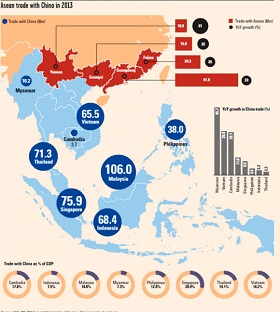On June 11, 2015, Aung San Suu Kyi, leader of Myanmar’s opposition party National League for Democracy (NLD) began a five-day visit to China. After being released from house arrest over four years ago, the 1991 Nobel Peace Prize winner has visited many countries in North America, Europe and Asia. Yet China, Myanmar’s most important partner and a major investor, has not established direct contact with either Aung San Suu Kyi or her party.
On June 11, 2015, Aung San Suu Kyi, leader of Myanmar’s opposition party National League for Democracy (NLD) began a five-day visit to China. After being released from house arrest over four years ago, the 1991 Nobel Peace Prize winner has visited many countries in North America, Europe and Asia. Yet China, Myanmar’s most important partner and a major investor, has not established direct contact with either Aung San Suu Kyi or her party. More than a year passed after her release in November 2010 before she met with the Chinese Ambassador to Myanmar. At the same time, Aung San Suu Kyi has always recognized the importance of this giant neighbour for her country. In May 2011, for instance, during a video-link with the University of Hong Kong, she called on China to launch a dialogue with her party, which has been shunned by the country’s leaders. She also stated that she did not intend to choose between the West and China, since co-operation with both sides is needed for the development of Myanmar, and that she was waiting for an invitation to visit China.
The current visit of the NLD delegation and its leader is very important for China. In November 2015, Myanmar will hold its first free parliamentary elections in 25 years and the NLD has a good chance of winning. Even if article 59(f) is retained in the Myanmar constitution, preventing people with relatives holding foreign citizenship from running for President [1], Aung San Suu Kyi could hold the post of Prime Minister, which does not exist in the current President’s administration. On the eve of her visit to China, Aung San Suu Kyi received such a proposal from the speaker of the upper house of parliament.
The Chinese leaders realize how important Aung San Suu Kyi is and are receiving her at the level of a head of state, as has been the case in all the other countries she has visited in recent years. China’s interests in Myanmar are long term and strategic, so Beijing is prepared to establish good relations with the country’s potential leader. This is a good sign for bilateral relations between the two countries which have 2,185 kilometers common border.
Despite the increased influence of the United States in Myanmar, both internal and external factors prevent her from making a definitive choice in favour of the West and against China. Aung San Suu Kyi, tempered by the many years of confrontation with the military junta, has become a rather pragmatic politician for whom the main thing is state interests, which has often aroused criticism from human rights activities.
Therefore, the most sensitive question, which might overshadow the general picture of the visit, will probably not be discussed. We are talking here about the matter of the Chinese political prisoner Liu Xiaobo. Like Aung San Suu Kyi, he was awarded the Nobel Peace Prize for “his long and non-violent struggle for fundamental human rights in China” while imprisoned in 2010. The Chinese side probably considered that, since Aung San Suu Kyi refrains in her home country from making statements about various contentious issues [2], she will not do so in China either (or, if she does, it will be in a diplomatic manner).
The talks will probably focus on the upcoming elections and bilateral relations after that.
1. Aung San Suu Kyi is the widow of an Englishman and both her sons hold British passports.
2. For instance, on the problem of the Bengali Rohingya, armed conflicts in the north of the country with Kachin people and other ethnic groups, ethnic-confessional conflicts in Myanmar, etc.





